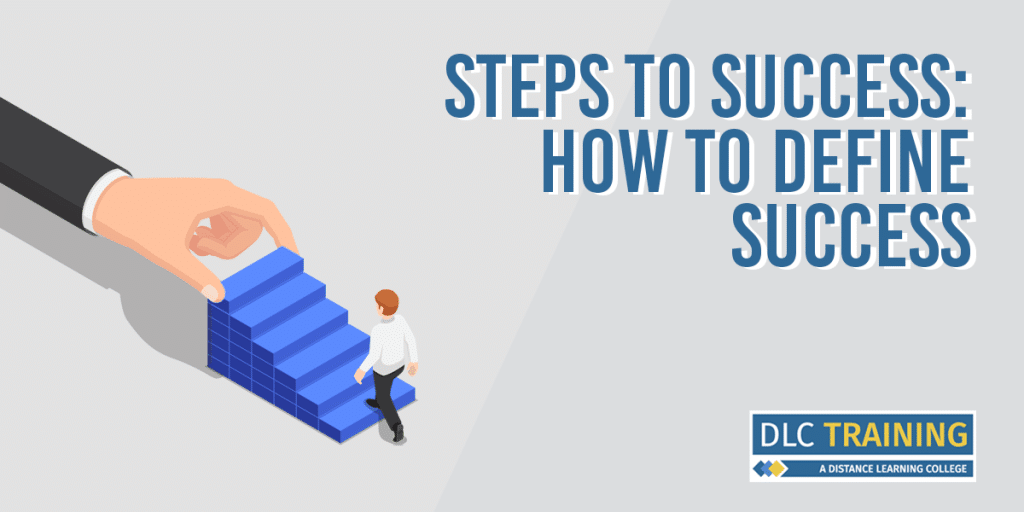In the first part of our new series, DLC Training’s Steps to Success, we’re starting at the beginning (as you might expect), and taking a look at how individuals can and should define success. We are examining Success in both the short and long term, and how your view of Success can change over time, and how that can affect whether you achieve it.

Views of Success
The Oxford Dictionary defines Success as “the fact that you have achieved something that you want and have been trying to do or get”, and the Cambridge Dictionary states it is “the achieving of the results wanted or hoped for”.
Both definitions outline the importance of subjectivity in success, focussing on an individual’s aims, hopes, and wants.
But on the other side, there is an objective and external idea of success as well. This idea is often linked to financial earnings, job titles, and prestige. Culturally we are told that luxury products, premium items, and designer brands (and the money to afford them) are a good metric for success. If we take it a step further comes down to the idea of owning or affording items that others can’t.
Success doesn’t, or at least shouldn’t, solely revolve around what others think of you, and so we should look at general success perhaps lying somewhere in between these two ideas. It’s partially down to other people’s perception and also relates to your aims.
Although this idea of general or perceived success is something to keep in mind, the most important metric for success should always be your own goals, happiness, and fulfilment. In particular, this should accompany a solid understanding of what and where you want to be.
How to Decide what Success Means and Looks like to You as an Individual
There is a range of factors and criteria in deciding what your own personal success and happiness will look like, the following fundamentals may not be everything you need, but they are a great starting place.
Lifestyle and Balance
One of the best places to start is deciding how your ideal lifestyle looks. Within this is what your daily life consists of, but also the balance of work, family, and everything in between.
When considering this, it’s important to keep a healthy realism, it’s great to aspire to a life where you work one morning a week and spend the rest of your time at the beach, but that’s a hard standard to weigh your success against if that is your only goal. Similarly, if you don’t prioritise personal time you can go too far in the opposite direction.
Finance
Although money isn’t always the best way to measure success (it’s certainly not the healthiest), an ambition for financial stability and security is another good place to help round out what your own personal success might look like.
Take a look at what sort of money you’d need to earn to live comfortably, as well as be able to do things you’d like to do.
Freedom
Linking to finance is the idea of freedom. Often people think they want more money, but actually what they are striving for is financial independence. So bear this in mind when you consider how much money you might need to earn, and what you want to do with it.
It’s not always possible to work in your dream job, but that doesn’t mean you can’t find happiness and success. For some, personal freedoms and spontaneity outside of work are key.
Values
Aligning your values with your idea of success is vital to achieving it, but also actually being happy and fulfilled when you do.
Someone who spends all of their spare time and money on charity work and helping others likely won’t be able to say they have the most expensive car, home, or clothes, but does that mean they haven’t been successful?
Most people would say that they’d done something extremely noble and worthwhile, and if their personal metric of success was to help others, they have aligned their goals, abilities, and values, resulting in success.
However your own personal success and happiness actually form, there is undoubtedly a connection between our actual happiness, how we see ourselves, and how we believe others see us. For some simply appearing successful to others could be enough of a success in itself.
Defining something like success is always going to be difficult, and involves several different ideas. Overall the above pillars are a solid place to start in defining your success and should help you on your way to not only understanding it but achieving it. In next month’s post, we’ll continue looking at success, and now that we’ve established what it means and where we need to be to achieve it, we’ll take a look at how to actually get there.